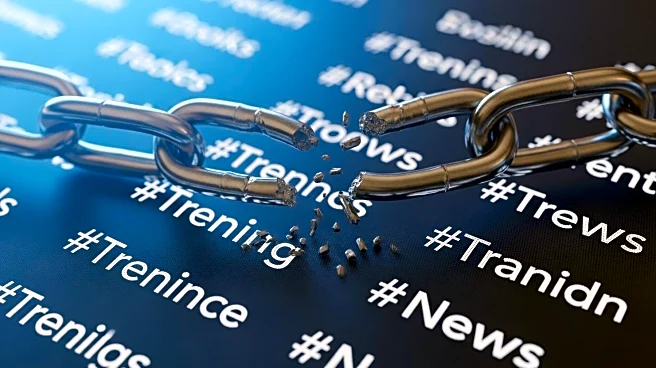What's Happening?
In the aftermath of the assassination of conservative activist Charlie Kirk on September 10, several individuals have faced job terminations or suspensions due to their social media comments regarding the incident. Public figures, academics, and business owners have been affected, with their posts attracting widespread condemnation. Notably, a Secret Service agent, an Office Depot employee, a junior Nasdaq employee, and a U.S. Marine have been placed on leave or dismissed. The University of Mississippi and Middle Tennessee State University have also terminated employees for making inappropriate comments. Additionally, MSNBC fired analyst Matthew Dowd for his on-air remarks about Kirk, and the Carolina Panthers dismissed a communications coordinator for related social media activity. A Cincinnati restaurant owner lost a contract with a local stadium after making offensive comments online.
Why It's Important?
This series of job losses underscores the significant impact of social media behavior on professional lives, especially in politically charged contexts. The swift actions taken by employers reflect a zero-tolerance stance towards comments perceived as insensitive or celebratory of violence. This situation highlights the broader societal expectation for responsible discourse, particularly in the digital age where private comments can quickly become public. The incident also emphasizes the ongoing tensions and divisions within the U.S. political landscape, as well as the potential repercussions for individuals who engage in controversial or inflammatory rhetoric.
What's Next?
Organizations and individuals may continue to face scrutiny over their social media conduct, prompting a reevaluation of personal and professional boundaries in digital communications. Employers might implement stricter social media policies to prevent similar incidents. The broader conversation around political violence and its implications for free speech and employment could lead to further debates and policy considerations. Stakeholders across various sectors may need to navigate the delicate balance between freedom of expression and maintaining a respectful and safe public discourse.
Beyond the Headlines
The firings and suspensions raise questions about the ethical responsibilities of individuals in positions of influence and the role of social media in shaping public opinion. The incident may prompt discussions on the limits of free speech, especially in relation to hate speech and its potential to incite violence. Additionally, the cultural and legal implications of such actions could influence future employment practices and the development of social media guidelines.









